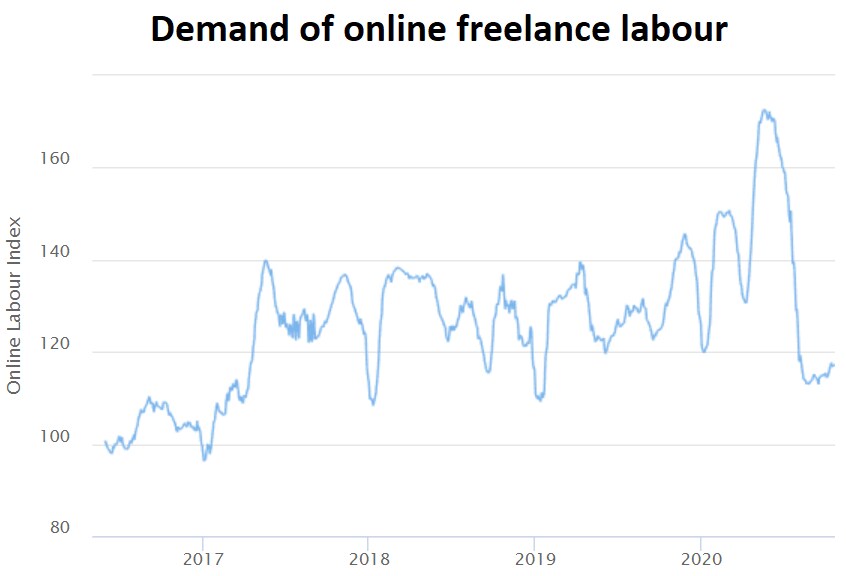How COVID-19 has hit offshore freelancers - and how they can bounce back

Image: Windows/Unsplash
Vili Lehdonvirta
Associate Professor and Senior Research Fellow, Oxford Internet Institute, University of Oxford
Explore and monitor how COVID-19 is affecting economies, industries and global issues

Get involved with our crowdsourced digital platform to deliver impact at scale
Stay up to date:
COVID-19
- In the short term, foreign freelancers have been among those hit hardest by the economic challenges of COVID-19, as jobs have disappeared.
- In the long term, more remote working could also bring opportunities to developing countries.
- But only if policymakers overcome key challenges to cross-border remote work.
COVID-19 has accelerated the trend toward remote work, as organizations adapted quickly to lockdowns by asking those employees able to do so to work home. Consequently, nearly 40% of employees have been working remotely in OECD member countries during the pandemic, an unprecedented shift in labour dynamics.
Removing the physical need for employees to be in the office has raised a number of questions about how the workforce will look like in the future. From the point of view of international trade, one of the most pressing questions is, could more remote working lead to a rise in the use of offshore freelancers?
Hiring people from other countries for short-term projects can often be cheaper or provide access to a wider variety of skills than hiring employees from the local workforce. Internet connectivity and increased speed have allowed for increased trade in services across borders.
Online labour platforms, including Freelancer, Guru, Peopleperhour and Upwork, have magnified the opportunities created by increased connectivity. They have gathered the enormous supply of freelance workers into virtual hubs and provided workers and employers with tools to enhance trust and make remote work possible. For example, these websites feature rating systems that allow freelancers and clients to choose each other based on the ratings and comments left by previous partners. Online labour platforms also provide reliable payments methods, even though substantial challenges remain to be tackled.
Freelancers from developing countries have been especially well-positioned to benefit from these tools, as their services are comparatively cheaper. Economist Richard Baldwin calls this phenomenon “telemigration.”
Data gathered by the Oxford Internet Institute’s Online Labour Index, an economic indicator that measures the supply and demand of online freelance labour across countries and occupations in real time, finds that the number of tasks posted on online work platforms increased from 2016 to 2019. With the onset of COVID-19, the number of projects first increased and then sharply decreased.

According to a recent paper analyzing US online workers during the pandemic, the increase could be explained by a rise in the use of online labour as a substitute for on-site jobs. The following decrease occurred as businesses affected by the pandemic had to cut many tasks considered non-essential.
As the effects of the pandemic are still being felt, there is no clear evidence yet on how the demand for freelancers will fluctuate in the short term. But the recent loss of jobs makes clear that, despite being a relatively new form of job provision, online freelance work still depends on a resilient non-digital economy.
Yet it's likely that freelance remote work continues to rise in the long-term. A recent Deloitte survey showed that the pandemic can cause a long-term boost in remote working. In addition, businesses offering innovative freelance activities or increasing freelancer productivity (for example, technology company TransparentBusiness) are thriving and showing promising avenues for the activity in the future.
To realize the opportunities of remote foreign freelance work, we first must address three main challenges.
First, there are growing demands for fair labour conditions, as freelancers have been largely excluded from social protection schemes.
Second, there is a need to calibrate foreign freelancers' income tax systems in a predictable and fair way for all the parties involved. So far, EU countries have been leading these initiatives by proposing innovative ways to obtain income data directly from platform companies.
Third, all stakeholders have work to do to ensure that foreign freelance activities translate into broader development gains to the countries where the workers are located. By investing in strategic digital skills training, countries have the opportunity to both place their workers in the most capital-intensive freelance activities and to attract the digital foreign direct investments (FDI) needed to succeed in the digital era.
A forthcoming white paper developed by the World Economic Forum on digital FDI found, through a survey with more than 300 companies, that the level of digital skills in the economy is the most important factor motivating investments abroad in the digital economy.
It is up to governments, businesses, social partners, and other relevant stakeholders to come together to develop solutions that ensure fair labour conditions, social protections, innovative taxation schemes, and broader societal gains in the post-COVID-19 era.
One possible solution is to move towards universal social protection that is neutral with regards to forms of employment and self-employment. This could involve portable benefits attached to the worker rather than to the job, and ‘underemployment insurance’ or social insurance that addresses fluctuating and episodic income.
Developing ‘government APIs’ or digital reporting windows that platforms could use to report income data directly to tax and social insurance institutions would increase coverage and cut red tape for platform workers.
Finally, fostering new forms of ‘social dialogue’, in which workers voices find expression via social media and other digital channels, could reinvigorate social dialogue and help policymakers and other stakeholders find collective solutions that ensure broad social gains.
Don't miss any update on this topic
Create a free account and access your personalized content collection with our latest publications and analyses.
License and Republishing
World Economic Forum articles may be republished in accordance with the Creative Commons Attribution-NonCommercial-NoDerivatives 4.0 International Public License, and in accordance with our Terms of Use.
The views expressed in this article are those of the author alone and not the World Economic Forum.
The Agenda Weekly
A weekly update of the most important issues driving the global agenda
You can unsubscribe at any time using the link in our emails. For more details, review our privacy policy.
More on Health and Healthcare SystemsSee all
Katherine Klemperer and Anthony McDonnell
April 25, 2024
Vincenzo Ventricelli
April 25, 2024
Shyam Bishen
April 24, 2024
Shyam Bishen and Annika Green
April 22, 2024
Johnny Wood
April 17, 2024





